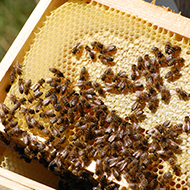
Concerns raised over the potential impact of the small hive beetle on British bees.
A petition has been launched calling on the UK government to stop the importation of honeybees into Britain from the European Union via Northern Ireland.
The petition, started by British Beekeeping Association (BBKA) chair Anne Rowberry, states that unrestricted bee movement could allow small hive beetle to arrive and ‘devastate’ British beekeeping.
It adds: ‘If small hive beetle was to be imported into GB with the bees, the risks to the bee population would be very great. The beetle can multiply to huge numbers quickly; eating brood, honey, pollen, destroying combs causing fermentation of the honey.
‘If uncontrolled they ultimately destroy the colony. Within two years of its discovery in the USA at least 20,000 colonies were destroyed costing millions of dollars. The economic impact on UK beekeeping and the pollination service could be devastating.’
The petition comes in response to media reports that bee trader Patrick Murfet is planning to import 1,500 Italian bees into Northern Ireland for onward shipment to Britain.
Murfet's proposals have been met with anger from British beekeeping organisations, which claim the bees are being sourced from Puglia, southeast Italy, just 200 miles from outbreaks of small hive beetle.
"[Small hive beetle] is a nasty pest of honeybee colonies and would have a devastating effect on the British and Irish bees," explained John Hill, vet and president of the British Bee Veterinary Association. “Small hive beetle arrived in Florida in 1998 and in two years killed 20,000 colonies and has since moved through the US to Canada. Once introduced, it is almost impossible to eradicate.”
Before Brexit, queens and package bees (a box with between 10,000 to 14,000 worker bees) could be imported into Britain. Since the end of the Transition Period, however, only queen bees can be imported directly into the UK from the EU.
Defra states that anyone looking to import bees to Britain should check the available guidance before doing so to avoid importing prohibited material. It adds that any packages and colonies of bees that are imported into GB from the EU would have to be returned to their original location.
Mr Hill stressed that many Irish beekeepers also keep a strain of bee called the Irish Black Bee, which is believed to be the most genetically-pure species of black bee in Europe.
“Allowing upwards of 15 million bees to fly in NI could have a detrimental effect on this gene pool,” he said. “It was initially thought that this importation by NI was illegal, but officials have said no, it is not anti-avoidance and should have unfettered access. Beekeeping organisations from all over Ireland, Scotland, Wales and England are all against this and have lobbied politicians to no avail so far.”
At the time of writing, the petition has garnered more than 13,000 signatures. After 10,000 signatures, the government is obliged to respond, and at 100,000 signatures, it will be considered for debate in parliament.



 The latest
The latest